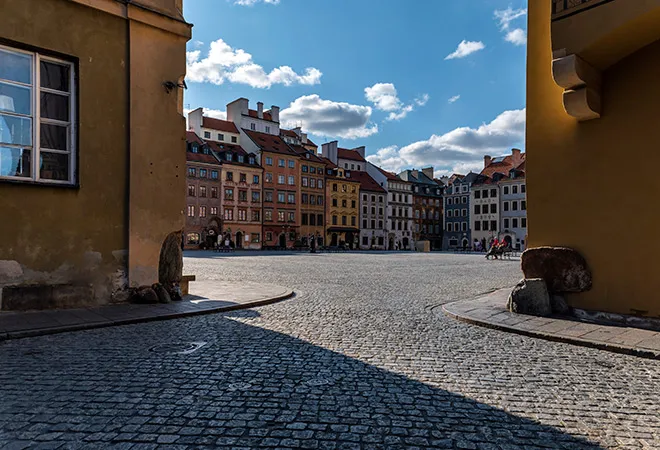
Amid the coronavirus outbreak in Europe, Polish policymakers decided to respond to the challenge rapidly and radically, bringing public life to a standstill on 12 March. So far, their early decision-making seems to have yielded satisfying results with regard to the slowdown of the disease’s spread – there are relatively few active cases in the country, about 2000 cases in a population of 37.5M, as of 30 March 2020. However, these results might be misleading, as the ratio of conducted tests (roughly 30K) is still low compared to those of neighbouring countries (Germany, with a population of 83M, conducts around 260K tests weekly). The government and the Polish Parliament have been also working on the so-called Anti-crisis Shield (Tarcza antykryzysowa), a set of legislative and policy tools designed to bring relief to the troubled economy.
There is also a constitutional aspect to the crisis. Those who argued Poland is drifting away from the principles of rule of law, are now equipped with new arguments. The ruling Law and Justice party (PiS) introduced amendments to the electoral law against the jurisprudence of the Constitutional Court and Parliament’s own regulations. These changes were voted in on 27 March at night, as a part of the “Anti-crisis Shield”.
The sword of politics
Everyday life in Poland has come to a standstill, as schools, restaurants and big shopping centres closed down. Even religious ceremonies have been restricted to five persons, which initially stirred up a heated discussion within the church administration. Children are obliged to participate in classes through ad-hoc makeshift arrangements like working with e-learning platforms, and university classes are also shifting to online gatherings. In the first half of March, the parliament worked on a bill (Specustawa), which shall give the executive extraordinary powers in these times. ‘Specustawa’ entered into force on 8 March.
Although the new regulations enjoyed the support of a vast majority in the Parliament, some MP’s and human rights activists warned that the bill could establish an extra-constitutional, permanent state of emergency, giving excessive power to the government. Acting within the remit of ‘Specustawa’ the Polish Minister of Health declared a ‘state of epidemic risk’, but the government did not declare a legal state of emergency – which would then mean postponing the upcoming presidential elections (10 May). The Opposition has contested this, claiming that the epidemic outbreak has rendered it impossible to continue a fair campaign, as all gatherings are banned. Mass-participation in the upcoming elections is likely to lead to the further spread of the Coronavirus.
...and the ‘Anti-crisis Shield’
Currently, it seems that Polish public opinion favours the government’s fast and radical reaction to the epidemic. According to public perception, Polish health care is inefficient and not well prepared for the epidemic. In normal circumstances, Poles need to wait months before they can see a specialist doctor, and it takes far too long to get oncology treatment. There was therefore no alternative to acting quickly.
However, this timely reaction is causing much harm to the economy. The government has tried to minimise the risk of bankruptcies and unemployment by establishing an ‘Anti-crisis Shield’, worth around 212 bn PLN (around 47 bn euro). Its main target is to maintain the financial liquidity of businesses and help entrepreneurs and employees. The former, however, are not entirely satisfied with the government’s proposals. In the eyes of Polish business associations, the proposed solutions are inadequate, considering the sheer scale of the crisis at hand. They are also highlighting that the ban on Sunday trading should be lifted, and the payment of tax liabilities should be postponed by three months.
The government is also seeking to cost-cut within the sphere of public administration, and the Ministry of Foreign Affairs will probably be one of the first affected. Currently, the Polish zloty has weakened dramatically with respect to the US dollar and the euro, which has significantly raised the cost of maintenance of diplomatic missions abroad.
Reinstating national borders
Poland decided to impose full border controls on March 13, when the number of active cases was still below 100. All non-resident foreigners were banned from entering the country and the government imposed a 14-day quarantine on its citizens returning home, in a bid to curb the spread of coronavirus. In less than 48 hours, Poland cancelled all international inbound flights and trains, which left tens of thousands of Poles stranded in different places around the globe. They were promised that they would be assisted by the government-sponsored #LOTdoDomu (FlyHome) - a program set up to help Polish nationals to return to the country as well as aid Polish national airlines in maintaining liquidity.
One downside of the quick but unilateral action taken by the Polish government was that it surprised partners within the EU. Many Poles working in Germany decided to rush back home, as they were worried about the 14-day quarantine and wanted to return before 15 March. As a result, it was difficult to obtain a bus ticket. This sudden migration also led to a huge increase in traffic, with some people waiting more than 40 hours to reach the Polish border. Moreover, the Polish government also implemented new quarantine rules for cross-border workers. Each of them, after coming back to Poland, needed to undergo a 14-day self-quarantine period, which further paralysed border life.
Poles sought to rush back home for a variety of reasons. First, many Poles work in a shadow economy without a legal contract, i.e. housekeepers, nannies, construction workers or senior care assistants. Most of them, afraid of losing their source of income in Germany, decided to return home and wait out the crisis in their place of origin. Others working without a fixed contract could have been worried about the their health insurance cover. On March 25, Germany additionally decided to ban seasonal workers coming from outside of the EU and the Schengen area from entering its borders. According to Spiegel, a German weekly, it is still unknown whether this constraint will also touch Polish and Czech seasonal workers. This may result in problems both for the German agriculture industry, which previously welcomed blue collar workers from the eastern parts of the EU, and for many Polish families dependent on money sent back home.
Keeping silent internationally
While Polish commentators have criticised the lack of solidarity at the EU level, an effective Polish contribution to the EU is nowhere to be seen. Poland seems to exhibit a siege mentality, just like many other countries, claiming that the biggest danger comes from the outside. All in all, the epidemic has become a politicized subject, leading to the popular myth that there is nowhere better to be than in Poland, which still has a low ratio of people infected.
Recently, Warsaw became the centre of a US-China diplomatic spat, as US ambassador Georgette Mosbacher claimed that Beijing falsely accused the US of having anything to do with the spread of the coronavirus, and argued that China infact failed in informing the public about the new coronavirus. The Chinese ambassador in Poland promptly responded that spreading the political virus of distrust is more dangerous than the novel coronavirus.
In the wake of this diplomatic exchange of views, Poland has kept a rather neutral position. Polish policymakers have accepted medical help from China, and Polish enterprises bought necessary medical equipment from the country. As the Corona-crisis unfolds over the weeks to come, Poland should be prepared for more internal and international challenges which shall seek to test its resilience in a whole variety of ways.
The views expressed above belong to the author(s). ORF research and analyses now available on Telegram! Click here to access our curated content — blogs, longforms and interviews.




 PREV
PREV


